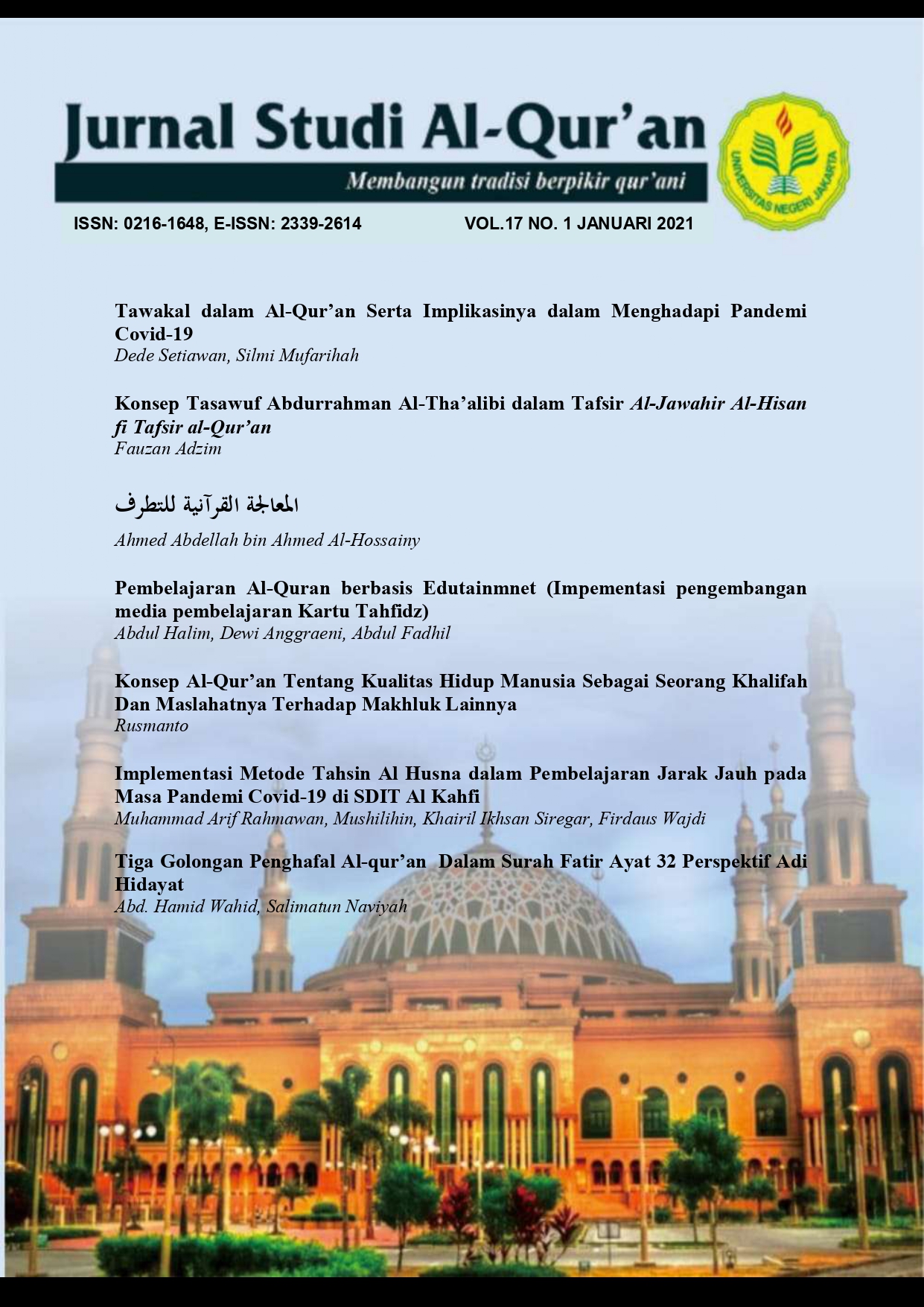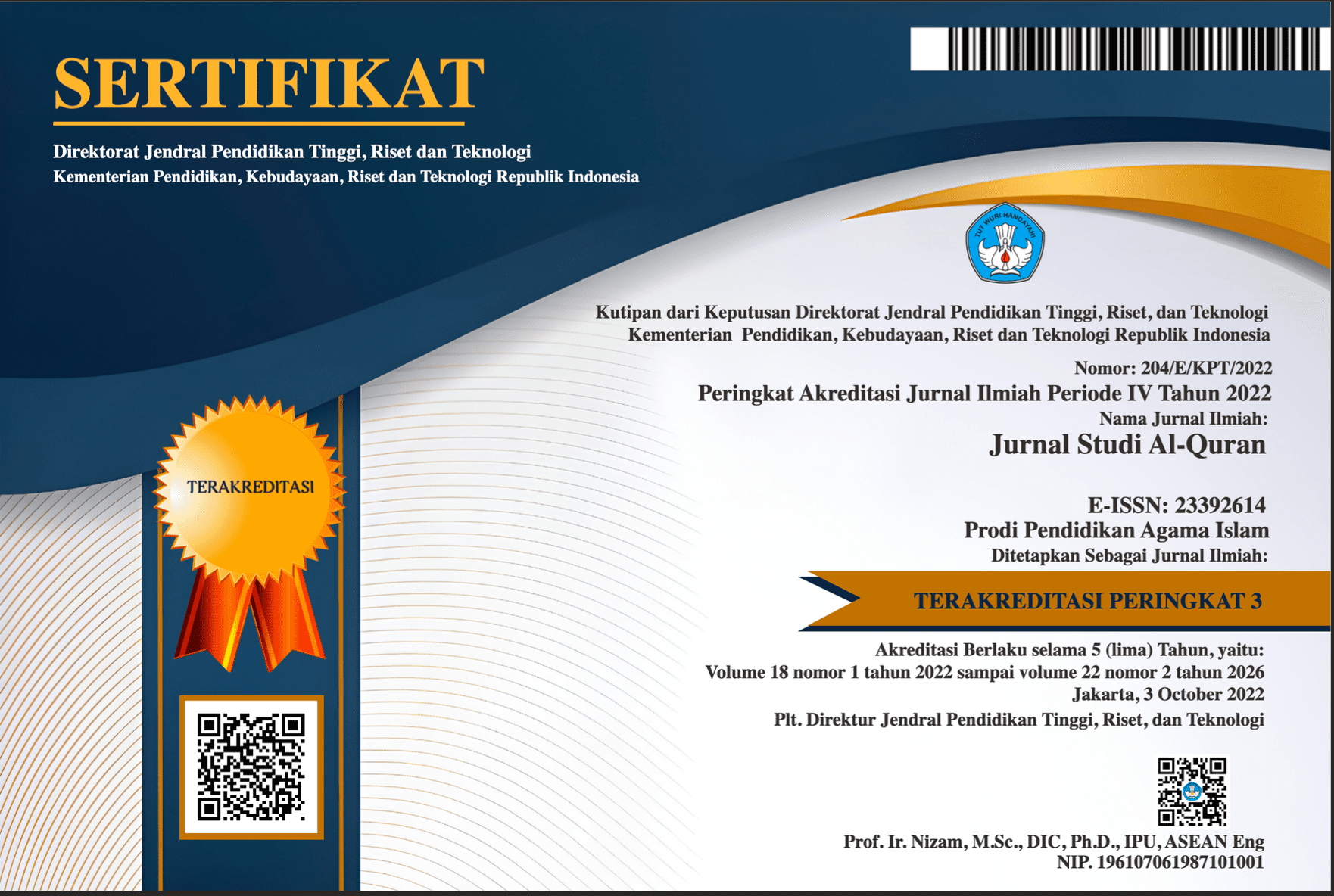Tiga Golongan Penghafal Al-qur’an Dalam Surah Fatir Ayat 32 Perspektif Adi Hidayat
DOI:
https://doi.org/10.21009/JSQ.017.1.07Keywords:
memorizing Qur'an, Adi Hidayat, surah Fatir 32Abstract
The purpose of writing this article is as a study that is very important to understand, especially for Qur'an memorizers. This article discusses the class of Qur'an memorizers contained in the al-Qur'an surah Fatir verse 32, especially according to Adi Hidayat. With his educational background and life since he was a child, he was educated to love Qur'an, the preaching he conveyed could not be separated from the study of memorizing the Qur'an. Qur'an memorizers are Allah's chosen people who have been given the gift to be closer to Qur'an and the mandate to protect it. The final result of this discussion is that Adi Hidayat states that in the Qur'an there are three groups of Qur'an memorizers, namely Dzalimun Li Nafsih, Muqtashid, and Sabiqun Bil Khairat. And the fact that at this time is that memorizing the Qur'an is more focused on the number of memorization and forgetting to understand and memorize the verses that are memorized, so that memorization does not benefit him. This study uses a type of media text research with a descriptive qualitative approach. Data collection techniques through observation and documentation.
References
Cahyono, Guntur, ‘Pemanfaatan Media Youtube Dakwah Ustadz Adi Hidayat Dalam Pengembangan Materi Fikih Madrasah Ibtidaiyah’, 1.1 (2019)
Depag, AL-qur’an dan Tafsirnya, jilid VIII, Yogyakarta: PT. Dana Bakti Wakaf, 1990
I, Aida Hidayah S Th, and M Hum, ‘Metode Tahfidz Al-Qur ’ an Untuk Anak Usia Dini ( Kajian Atas Buku Rahasia Sukses 3 Hafizh Quran Cilik Mengguncang Dunia )’, 18.1,
Masduki, Yusron, ‘Implikasi Psikologis Bagi Penghafal Al-Qur’an’, Medina-Te, 18 (2018),
Nawawi, Imam, At-Tibyan fi Adabi Hamalatil Qur’an, Terjemahan Umniyyati Sayyidatul Hauro’ dkk, Solo: AL-Qowam, 2014
Pertiwi, Putri, Pesan Dakwah Ustadz Adi Hidayat Dan Persepsi Mad’u Di Masjid Ad-Du’a Kelurahan Way Halim Kota Bandar Lampung, Skripsi UIN Raden Intan Lampung, 2018
Quthb, Sayyid, Tafsir Fi Dzilal al-Qur’an, Jilid 12
Shihab, M. Quraish, Tafsir Al-Mishbah, Jakarta: Lentera Hati, 2002, Jilid 11
Supriono, Iwan Agus, and Atik Rusdiani, ‘Implementasi Kegiatan Menghafal Al-Qur’an Siswa Di Lptq Kabupaten Siak’, Isema (Jurnal Islamic Education Manajemen), 4.1 (2019), <https://doi.org/10.15575/isema.v3i2.5281>
Ulumuddin, ‘Memahami Hadist-Hadsit Keutamaan Menghafal Al-Qur’an Dan Kaitannya Dengan Program Hafiz Indonesia Di RCTI’, Al-Quds, 4 (2020), <https://doi.org/10.29240/alquds.v4i1.1103>
Widiani, Desti, ‘Implementasi Metode Famī Bisyauqin Dalam Memelihara Hafalan Al-Qur’ān Pada HuffāẒ Di Ma’had Tahfidzul Qur’ān Abu Bakar Ash-Shidiq Muhammadiyah Yogyakarta’, Jurnal Studi Al-Qur’an Membangun Tradisi Berfikir Qur;\’ani, 15.2 (2019),
Downloads
Published
How to Cite
Issue
Section
License
Authors who publish with this Journal agree to the following terms:
- Author retain copyright and grant the journal right of first publication with the work simultaneously licensed under a creative commons attribution licensethat allow others to share the work within an acknowledgement of the work’s authorship and initial publication of this journal.
- Authors are able to enter into separate, additional contractual arrangementfor the non-exclusive distribution of the journal’s published version of the work (e.g. acknowledgement of its initial publication in this journal).
- Authors are permitted and encouraged to post their work online(e.g. in institutional repositories or on their websites) prior to and during the submission process, as it can lead to productive exchanges, as well as earlier and greater citation of published works.
Users/public use of this website will be licensed to CC BY










